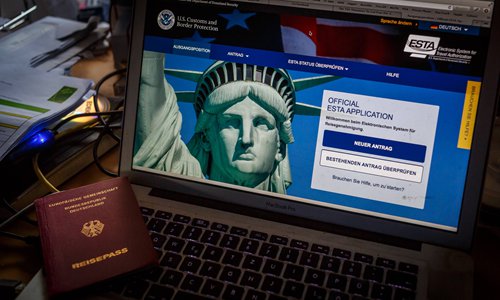HOME >> CHINA
Dispute results in challenges for Chinese nationals in US
By Xue Keyue Source:Global Times Published: 2019/7/7 18:38:39

The US visa application webpage Photo: IC
Chinese nationals living in the US said they are paying the price of the US-initiated trade war, which has spread beyond broad economic measures to the technology, education and tourism sectors.
Analysts warned that if the US government want the nation to see stable long-term development, they should return to collaboration and opening-up with China.
Interviewees reached by the Global Times, who work or study in advanced Science, Technology, Engineering and Math (STEM) fields, said they are facing tougher visa restrictions and fewer university and job offers in the US this year.
"None of my friends (in STEM) have got the five-year F1 student visa since recent tensions between the two sides began boiling over. And we have met tighter and longer US visa scrutiny," Wang Bo, a PhD student majoring in Chemical Engineering at Rice University in the US, told the Global Times. When Wang applied to renew his US visa last year, he had to wait about one month before getting it issued.
"We don't even dare go back to China for holidays. My senior, who went back to China during the Spring Festival in February, has not gotten her passport back. Also, tourist visa applications by many students' parents have been checked or even rejected," said Wang.
It is a sharp contrast to years before, when students sailed through the application process in two weeks.
It's not just his visa that Wang is worried about. Tighter visa scrutiny could even slow the scheduled graduation progress.
"Since the spring, the US visa refusal rate for Chinese overseas students has been rising," said a Chinese surnamed Zheng who lives in Virginia and works as an administration officer for American universities. Zheng said that eight Chinese students out of 15 who applied for schools were rejected, and those eight students were rejected again in the second round of reviews.
"Chinese professors and people with doctorate degrees around me have to go through American customs inspections when they go back to China. This includes having their passports and electronic equipment checked," Zheng said.
There are currently some 1.1 million overseas students in the US, one-third of whom are Chinese.
Xu Yongji, deputy head of the Department of International Cooperation and Exchanges under China's Ministry of Education (MOE), said in 2018 that the ministry sent 10,313 students to study in the US at public expense, and 331 students were denied visas, or 3.2 percent. From January to March this year, the MOE sent 1,353 students to study in the US, of whom 182 were refused visas, or 13.5 percent.
Amid recently tightened US visa policies for Chinese students and scholars on the grounds of a national security threat, the MOE warned in June of the risk of applying to study in the US.
In addition to students and scholars, some Chinese people applying for jobs in the US have also been rejected by American companies.
The number of H1B visas offered to Chinese appliers has dropped sharply, a Chinese graduate with a master's degree in materials science from a top American university, who asked for anonymity, told the Global Times. The graduate recently returned to China to seek a job.
Chinese traders in the US are also suffering from the higher duties imposed by the US on Chinese goods.
Zheng, a Chinese cross-border surrogate buyer - daigou in Chinese - who lives in eastern US, said his business has been hit by the higher costs of American goods.
Another daigou surnamed Liu, said that he had lost 4,000 yuan ($842) from a delayed parcel sent to China, which was held by US customs for months.
"We really don't want the US-initiated trade war," Liu said, a sentiment echoed by other Chinese merchants living in the US reached by the Global Times.
On May 13, China struck back at the US tariffs on Chinese goods, announcing duties of between 5 percent and 25 percent on more than 5,100 products from the US worth tens of billions of dollars after the US shrugged off widespread warnings and hiked tariffs on Chinese goods.
Despite the challenges facing them, the interviewees said that their daily lives in the US had not been affected yet, as they have a strong motherland backing them and also because they know China will always be open toward exchanges and cooperation with the US.
"Both sides will suffer a lot in academia and technology, even social development, if political considerations disrupt normal people-to-people communications," Zhang Zhizhou, assistant research fellow at the Institute of International Studies at the Beijing Foreign Studies University, told the Global Times.
"It's unnecessary to worry about these policies, which are not welcomed even among the US people. Instead, we need to be cautious about the hyped-up unfriendly rhetoric against China by some US politicians," Zhang said. Some of them have made Chinese nationals out to be robbers who have taken many US jobs, Zhang said.
Newspaper headline: Trade war fallout
Posted in: IN-DEPTH,CHINA FOCUS